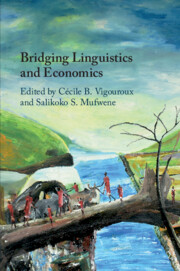Book contents
- Bridging Linguistics and Economics
- Bridging Linguistics and Economics
- Copyright page
- Contents
- Figures
- Tables
- Contributors
- Preface
- 1 Do Linguists Need Economics and Economists Linguistics?
- 2 Economists Do Need Linguists
- 3 The Invisibility of Linguistic Diversity Online
- 4 Evaluating Language Policy and Planning
- 5 The Economics of Language Diversity and Language Resilience in the Balkans
- 6 Determinants of Bilingualism among Children
- 7 Economy and Language in Africa
- 8 The Unequal Exchange of Texts in the World Language System
- 9 Language Economics and Language Rights
- Author Index
- Subject Index
- References
4 - Evaluating Language Policy and Planning
An Introduction to the Economic Approach
Published online by Cambridge University Press: 02 March 2020
- Bridging Linguistics and Economics
- Bridging Linguistics and Economics
- Copyright page
- Contents
- Figures
- Tables
- Contributors
- Preface
- 1 Do Linguists Need Economics and Economists Linguistics?
- 2 Economists Do Need Linguists
- 3 The Invisibility of Linguistic Diversity Online
- 4 Evaluating Language Policy and Planning
- 5 The Economics of Language Diversity and Language Resilience in the Balkans
- 6 Determinants of Bilingualism among Children
- 7 Economy and Language in Africa
- 8 The Unequal Exchange of Texts in the World Language System
- 9 Language Economics and Language Rights
- Author Index
- Subject Index
- References
Summary
This chapter focuses on the contributions of economists to the selection, design, and evaluation of language policies, particularly since the late 1970s. We show how to perform status analysis using available data on earnings, language skills, language of work, and language of consumption. Then, we turn to the evaluation of the costs and benefits of language policy measures. We add a section on the use of stylized data, an approach common in economic theoretical modeling and empirical evaluation. Finally, this chapter discusses some challenges in understanding the role of economic processes in language issues.
Keywords
- Type
- Chapter
- Information
- Bridging Linguistics and Economics , pp. 109 - 139Publisher: Cambridge University PressPrint publication year: 2020
References
- 11
- Cited by



